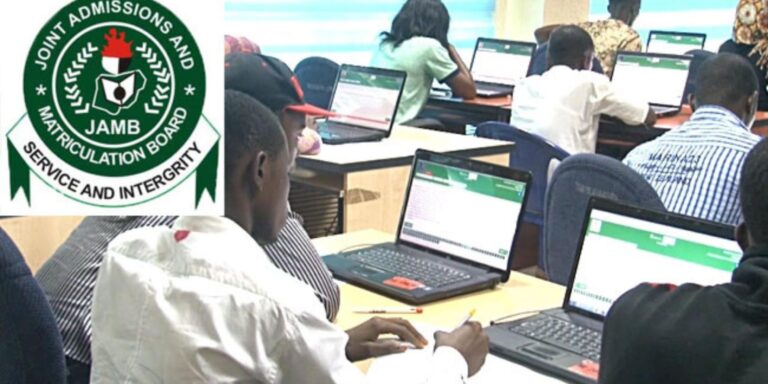The Joint Admissions and Matriculation Board (JAMB) has officially released the results of the 2025 Unified Tertiary Matriculation Examination (UTME) resit, conducted for candidates affected by disruptions at select centres during the main examination.
However, the release comes amid revelations of widespread examination malpractice involving candidates, proprietors of schools, and Computer-Based Test (CBT) centres.
In a statement released on Sunday and signed by JAMB’s Public Communication Advisor, Dr. Fabian Benjamin, the Board disclosed that of the 336,845 candidates scheduled for the resit, 21,082 were absent. Despite the controversies and ongoing investigations, JAMB noted that performance trends remain consistent with historical patterns, ranging from 11% success rate in 2013 to 34% in 2016.
The Board’s Chief External Examiners (CEEs), chaired by Prof. Olufemi Peters, Vice-Chancellor of the National Open University of Nigeria (NOUN), reviewed the resit exercise and invited psychometrics expert Prof. Boniface Nworgu to validate the results before release.
A series of critical decisions were reached during a nationwide meeting of CEEs, including the conditional release of results for underaged candidates, those implicated in online “WhatsApp runs,” and candidates who missed the resit due to valid reasons.
JAMB stated that results of underage candidates—many of whom had earlier acknowledged in writing that only those who meet minimum academic standards would be considered for special admission—have been released for record purposes, though they do not qualify for admission.
Similarly, candidates involved in academic misconduct via illicit WhatsApp groups and other solicitation platforms were granted a one-time waiver. However, JAMB warned this should not be misinterpreted as condoning wrongdoing and urged candidates to steer clear of anti-social and fraudulent networks.
For absentee candidates, especially those who missed both the main UTME and the resit, a final opportunity has been provided to participate in the annual mop-up examination.
Meanwhile, several CBT centres have been blacklisted for egregious acts of malpractice, including altering biometric data and facilitating impersonation. Proprietors of these centres will be prosecuted, and individuals directly involved in the fraudulent registrations are to be apprehended, the statement said.
“Collusion of certain CBT centre/school proprietors (with the connivance of accredited centres) to hack the networks of targeted CBT centres, thereby gaining control of candidates’ computers and remotely submitting their responses to the relevant local server of the centre as recently discovered by the security agencies to whom we are profoundly grateful,” it said.
JAMB raised alarm over sophisticated cheating techniques uncovered during the 2025 exams, which include AI-enabled photo manipulation to facilitate impersonation, hacking of CBT centre networks, extension of local networks to hidden “strong rooms,” and the pairing of candidates with “mercenaries” who sit for the exam on their behalf.
“While some Nigerians are busy dissipating energies on conspiracy theories and spread of hatred, our future is being put in jeopardy by advanced level of digitalised fraud,” the Board stated.
“During the 2025 examinations, further high level malpractices were uncovered, which led to the withdrawal of some results and the arrest of several culprits across the country some of whom we understand have made useful confessions.”
More than 3,000 candidates have been identified as accomplices or beneficiaries of these malpractices, and JAMB has vowed to withdraw their results once investigations are concluded.
JAMB also denounced tribal or sectional narratives surrounding the cancelled sessions in six states, calling them divisive and unhelpful. The Board clarified that there were no high-scoring candidates in the cancelled sessions, with 99% of those candidates scoring below 200.
In a notable case of misinformation, the Board discredited social media claims by one Mr. Olisa Gabriel Chukwuemeka, a first-year Public Health student at Adekunle Ajasin University, Akungba-Akoko (AAUA), who falsely claimed to have scored 326 in the 2025 UTME.
JAMB investigations revealed that Mr. Olisa’s post was a fabrication, having doctored his 2024 UTME result of 203 to falsely reflect a 2025 score of 326. His real 2025 result, recorded in Lagos, was 180 before it was withdrawn due to the ongoing investigation. Following the exposé, Mr. Olisa deactivated his account on social media platform X (formerly Twitter).
Addressing complaints about result checking fees, JAMB clarified that the SMS shortcode service (55019/66019) is subsidised by the Board and intended to protect candidates’ data from exploitation by cybercafés.
Candidates with previously released results are advised not to recheck their scores unless they receive direct notifications via SMS, email, or their JAMB profile about result withdrawal due to verified infractions.
JAMB expressed gratitude to Nigeria’s security agencies for their support in unearthing and prosecuting examination fraud. Special appreciation was also extended to WAEC, Ahmadu Bello University, the Teachers Registration Council of Nigeria, and the National Examinations Council for adjusting their examination schedules to accommodate the UTME resit.
JAMB commended the resilience of affected candidates and reaffirmed its commitment to credible, fair, and technology-driven examination processes. Despite challenges, the Board declared that the CBT model remains the most viable system for curbing malpractice and modernising Nigeria’s education sector.
Dr. Fabian Benjamin concluded the statement by urging Nigerians to unite in protecting the integrity of the country’s education system against increasingly sophisticated forms of cheating.

